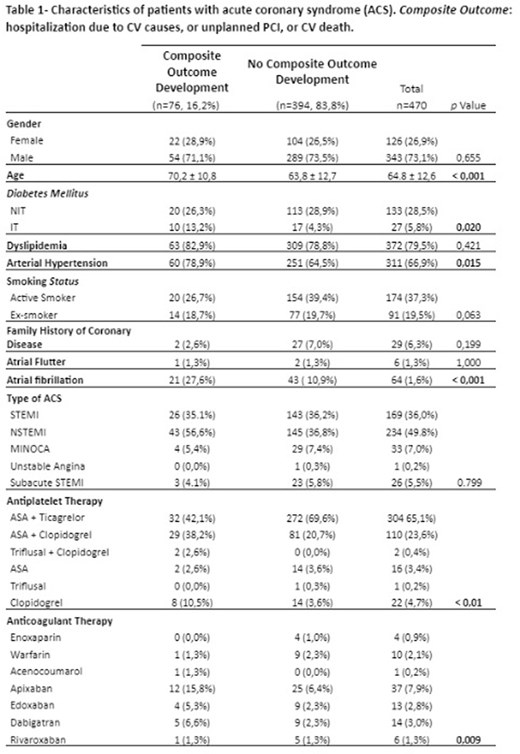-
PDF
- Split View
-
Views
-
Cite
Cite
S Andraz, J Massa Pereira, L Hamann, H Costa, M Espirito Santo, P Azevedo, D Bento, J Bispo, D Carvalho, R Fernandes, J Mimoso, Outcome predictors in acute coronary syndrome in patients submitted to percutaneous coronary intervention, European Heart Journal. Acute Cardiovascular Care, Volume 14, Issue Supplement_1, April 2025, zuaf044.068, https://doi.org/10.1093/ehjacc/zuaf044.068
Close - Share Icon Share
Abstract
Acute coronary syndrome (ACS) continues to be a frequent and prevalent event worldwide. Although in recent years there has been a tendency to reduce mortality associated with this cause, ischemic heart disease continues to be the main cause of death within patients with established cardiovascular diseases.
To determine the predictors of adverse cardiovascular outcomes in patients who have a history of an ACS, in order to alert clinicians for the need of risk factor control and enhance secondary prevention.
Observational and retrospective study that included 470 patients admitted for ACS and who underwent percutaneous coronary intervention (PCI) between January 2020 and December 2021 with a minimum follow-up of 23 months. Demographic characteristics of the sample, cardiovascular risk factors (CVRF), as well as the type of ACS and therapy used were collected. The composite outcome studied was hospitalization due to cardiovascular (CV) causes, or unplanned PCI, or CV death. Independent predictors were obtained using multivariate logistic regression.
A total of 470 patients were obtained with a mean age of 64.8±12.6 years, 73.1% were male. Of these, 76 (16.2%) achieved the composite outcome during the follow-up period. In terms of CVRF, 32.0% had Diabetes Mellitus (DM), 79.5% dyslipidemia, 66.9% arterial hypertension (HT) and 56.4% were smokers. The most common coronary event was acute myocardial infarction without ST segment elevation (50.1%) and the combination of ticagrelor and acetylsalicylic acid was the most used antiplatelet therapy (65.1%). The variables age (p<0.001), hypertension (p=0.015), atrial fibrillation (AF) (p<0.001), DM (p<0.001), type of antiplatelet (p<0.001) and anticoagulant therapy (p=0.009) showed to be associated with the occurrence of the outcome. Nevertheless, only age (OR=1.04, 95% CI 1.01-1.06, p=0.003), the existence of an AF diagnosis (OR=2.05, 95% CI 1 .08-3.91, p=0.029) or DM under insulin therapy (OR=3.30, 95% CI 1.35-8.12, p=0.009), were independent predictors of the occurrence of adverse outcomes.

Author notes
Funding Acknowledgements: None.
- acute coronary syndromes
- myocardial infarction, acute
- anticoagulation
- antiplatelet agents
- aspirin
- atrial fibrillation
- dyslipidemias
- percutaneous coronary intervention
- myocardial ischemia
- hypertension
- cardiovascular diseases
- diabetes mellitus
- st segment elevation
- heart disease risk factors
- cardiovascular system
- cause of death
- comorbidity
- demography
- follow-up
- diagnosis
- insulin
- mortality
- secondary prevention
- insulin administration
- ticagrelor
- composite outcomes
- smokers





Comments